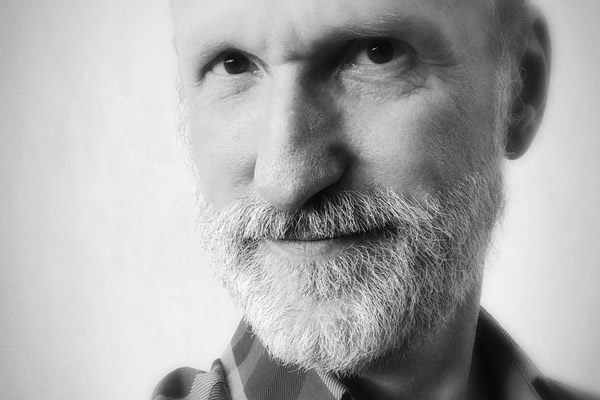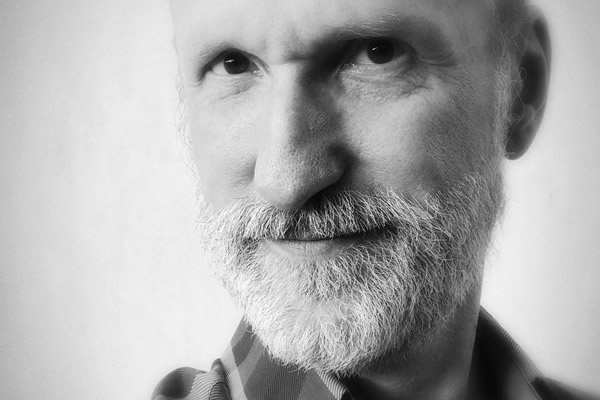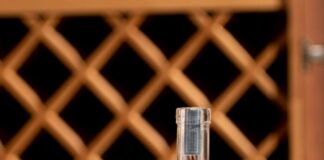“Asshole/battybat/big baby/blundering boob/…deaf & dumb/dick/dumbdumb/fag,” Deaf, gay poet and playwright Raymond Luczak writes in his poem “the easiest words to lipread in a schoolyard (even if you’re not deaf).
The poem appears in Luczak’s new book “Once Upon a Twin,” released this year by Gallaudet University Press.
Luczak, 55, who lives in Minneapolis, graduated from Gallaudet University in Washington, D.C. with a bachelor’s degree in English in 1988. He has written and edited more than 20 books, including “QDA: A Queer Disability Anthology,” the award-winning Deaf, gay novel “Men with Their Hands,” “The Kiss of Walt Whitman Still on My Lips” and the drama “Snooty: a Comedy.”
Growing up wasn’t easy for Luczak. He grew up in Ironwood, a small mining town in Michigan’s Upper Peninsula.
At eight months old, he lost his hearing due to double pneumonia and a high fever. This wasn’t detected until he was two-and-and-a-half years old. He was one of nine siblings in a hearing family.
At that time, many Deaf people weren’t permitted to communicate with their language – American Sign Language. Forbidden to sign, he was outfitted with a rechargeable hearing aid. There was no program for deaf children in Ironwood. For nine years, he stayed with foster families during the week in Houghton, a town two hours away. In Houghton he was in a speech therapy program.
Life opened up for Luczak when he enrolled at Gallaudet where he could communicate with American Sign Language.
In interviews conducted by email, Luczak talked with the Blade about a wide range of topics from coming out to what inspired him to write “Once Upon a Twin” to why Whitman would take selfies today.
Growing up as the only Deaf person in a hearing family was frustrating and infuriating for Luczak. “A classic situation: I’m sitting at the big kitchen table with all 11 of us, and everyone is talking at once,” Luczak said, “Where do I focus for lipreading? Why is my sister laughing? What was so funny?”
Luczak wants you to imagine what going through this for every meal would be like. It’s one thing if you endure this with strangers who know nothing about deafness, he said. But, it’s quite another thing if you’re with a family who should know better about your deafness.
“It’s as if they wanted to believe that my lipreading skills are so superior I didn’t need further assistance. Not true,” Luczak said. “I don’t have the ability to geolocate a sound so this explains why I cannot catch who is speaking and turn my attention in order to lipread that person.”
Language is a powerful bond for a community. In Milan, Italy in 1880, there was a conference on the education of the Deaf, Luczak said. There it was decreed that the use of sign language would be banned as a teaching method.
Up until then, “the Deaf community had a real Golden Age in which they came together through the establishment of Deaf residential schools, Deaf clubs and whatnot,” Luczak said.
It was devastating to the Deaf community when Alexander Graham Bell and his ilk made every effort they could to eradicate sign language, Luczak said. Luczak likens the attempt to eradicate sign language to the attempts made throughout history to force LGBTQ people to change their sexual orientation.
Luczak always knew that he was interested in men. Though, it didn’t have a name or specific feeling, and it had nothing to do with sex. He gradually came out, slowly, when he was in his teens.
Luczak came to Gallaudet University in the summer of 1984 and came out publicly a month later.
“What gave me the strength to come out were the first batch of books I’d bought from Lambda Rising [the LGBTQ bookstore that closed in 2010],” Luczak said. “That place was really my second home away from Gallaudet…And the fact that I was allowed to use ASL really gave me the self-confidence I had sorely needed all my life.”
Luczak in poetry, non-fiction, and plays has written in various styles from formal poetry to free verse about many topics from love to Thomas Edison to Walt Whitman to being queer. If Walt Whitman had a love child with a photographer’s eye, it would be Luczak.
In “Once Upon a Twin,” Luczak imagines what his life would have been like if he had a twin. Growing up, he knew that his mother had had three miscarriages, but he never asked her about them. When he was 16 “she mentioned that her third miscarriage happened in the same year I was born,” Luczak said, “and that it happened while she was sitting on the toilet. The fetus had apparently popped out.”
“I couldn’t get that image out of my head,” Luczak added.
Over the years, his mother told Luczak conflicting stories about the miscarriage. About 10 years ago, he looked into whether it was possible for a twin to miscarry and to have the other twin undetected in the womb. “It turns out that the ultrasound technology during the 1960s wasn’t advanced enough so the possibility was quite real,” Luczak said.
Luczak had long wondered how different his life would have been if his twin had survived. In 2018, he wrote a collection of formal verse. After that, he was eager to write in a different style. “Once I realized how I should write my next book (no formal poetry, almost no punctuation, etc.), it hit me that I really should explore the idea of my lost twin,” Luczak said.
“Would I feel as left out at family gatherings if my twin helped include me?” he said, “…Would my twin speak up for me?…I hadn’t dared to examine the possible changes in our family’s dynamics, and how it would’ve affected my self-confidence.”
Luczak was surprised by how easily the book wrote itself. It had been waiting a long time to be written.
Like queer poet Walt Whitman, Luczak’s creativity contains multitudes. In 2016, Luczak’s volume of poetry “The Kiss of Walt Whitman Still on My Lips” was released by Squares & Rebels. Because Whitman wasn’t taught to him when he was in high school or college, Luczak had few preconceptions about Whitman. Other than, he said, that Whitman was a poet with a boyfriend who was a streetcar conductor. But when he read the opening of the “Song of my Self,” Luczak said “Whoa!”
“The poet had conjured a palpable vision of what America could be,” he said, “if Walt were alive today, he’d be sharing selfies and Tweeting away.”
“He loved having his picture taken; he had 127 photographs taken when Abraham Lincoln scored 128 photographs,” Luczak said, “in fact, Whitman was probably America’s first celebrity nude model!”
How does Luczak feel about being a Deaf, gay writer? It’s complicated. On one level, he doesn’t think of himself as a Deaf, gay writer at all. “I do mention this fact but that’s only because I need to stand out a bit more in a country that brings out thousands and thousands of new books each year. It’s a marketing angle,” Luczak said.
He hopes readers will recognize that he’s much more than just a Deaf, gay writer and accept his work as beyond those labels.
Yet, “I still feel proud of being a Deaf gay man,” Luczak said. “It’s enriched my life in ways that I don’t think anyone would’ve anticipated. It’s certainly led me to meet people I wouldn’t have met otherwise. For that I’m grateful.”

Raymond Luczak (Photo courtesy of Luczak)








